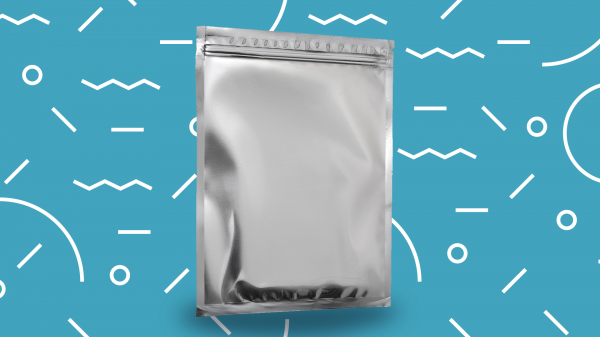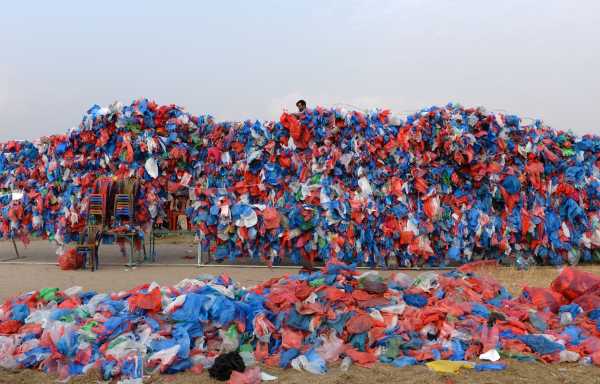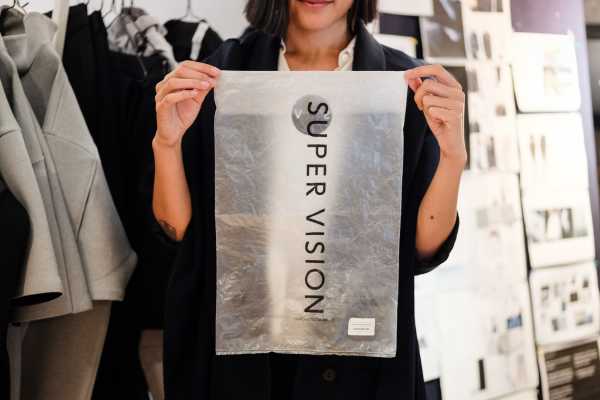
No online shopping company can figure out how to quit this one plastic bag
Polybags touch almost everything you order online.
By
Alden Wicker
Jan 31, 2019, 7:00am EST
Share
Tweet
Share
Share
No online shopping company can figure out how to quit this one plastic bag
tweet
share

In 2018, the healthy meal-kit service Sun Basket swapped out their recycled plastic box-liner material for Sealed Air TempGuard, a liner made of recycled paper sandwiched between two sheets of kraft paper. Fully curbside recyclable, even when wet, it allowed Sun Basket to reduce its box size by about 25 percent and reduce the carbon footprint of shipping, not to mention reduce the amount of plastic in their shipment. Customers were pleased. “Kudos to your packaging folks for coming up with this concept,” one couple wrote in.
It was an admirable move toward sustainability, but the truth remains: The meal-kit industry is one of many e-commerce sectors that still rely on (a frankly astonishing amount of) plastic packaging — way more pieces than you would ever bring home from the grocery store. Normally, you might purchase one glass bottle of cumin that would last you for a few years. But in a meal kit, each teaspoon of spice and each dollop of adobo sauce comes in its own piece of plastic packaging, and this pile of plastic is repeated every single night you cook up one of their pre-packaged recipes. It’s impossible to miss.
Sun Basket, despite its earnest attempts to improve its environmental footprint, still has to ship perishable food products in plastic bags. “Proteins, such as meat and fish, come to us already packed from outside vendors, who use a layered combination of polystyrene and polypropylene,” Sean Timberlake, senior content marketing manager at Sun Basket, told me via email. “This is industry standard material designed to ensure maximum food quality and safety.”

This reliance on plastic is not unique to shipping food. E-commerce retailers can easily offer up cardboard boxes with recycled content, FSC-certified tissue paper, and soy-based inks, which can all be stuffed in the recycling bin. They can tie reusable cloth ribbons or twine onto their goodies and pack their glass or metal containers in mushroom-based packing foam and starch packing peanuts that melt in water. But there’s one thing that continues to bedevil even the most sustainably minded brands: low-density, polyethylene, #4 virgin plastic film bags, known in the industry as polybags.
I’m talking about the clear ziplock or branded plastic bags that all your online orders come in, from meal kits to fashion and all the little components for toys and electronics. Although they are made from the exact same material as plastic grocery shopping bags, polybags used in shipping haven’t yet come under the same widespread public scrutiny, nor have they been subject to bans or taxes. But they are definitely a problem.
The impossibility of plastic-free and zero-waste shipping
An estimated 165 billion packages were shipped in the US in 2017, and many of them had polybags inside, protecting the garments or electronic components or buffalo steaks. Or the packages themselves were branded poly shipping bags, with poly dust bags of clothing inside. The Environmental Protection Agency reports that US residents use more than 380 billion plastic bags and wraps yearly.
This wouldn’t be such a crisis if we actually took care of our waste, but a lot of this plastic — 8 million tons a year — goes into the ocean, where researchers aren’t sure when, or even if, it will truly biodegrade. More likely it will just break into smaller and smaller toxic bits, which (despite being microscopic) are getting harder and harder for us to ignore. In December, researchers discovered that 100 percent of baby sea turtles have plastic in their stomachs. Microplastics have been found in tap water around the world, the majority of sea salt, and — on the other side of the equation — human poop.
Microplastics have been found in tap water around the world, the majority of sea salt, and — on the other side of the equation — human poop
Polybags are technically recyclable (and so are not, for example, on Nestlé’s “Negative List” of materials they plan to phase out of their packaging) and many states now mandate that grocery and convenience stores provide a bin for customers to return used plastic bags. But in the US, nothing gets recycled unless there is a business willing to purchase the recyclable material. Virgin plastic bags are so cheap, at 1 cent per bag, that old (often contaminated) ones are rumored to be worthless; they just get trashed. And that was before China stopped accepting our recyclables in 2018.
The burgeoning zero-waste movement is one response to this crisis. Adherents strive to send nothing to the landfill by reducing their purchases; recycling and composting everything they can; using and carrying reusable containers and utensils with them wherever they go; and patronizing businesses that provide package-free options. When one of these conscious consumers orders something from a supposedly sustainable brand and receives it in a polybag, it can be deeply frustrating.
”Just received an order from you and the items were wrapped in plastic bags,” a commenter responded to Everlane’s Instagram post promoting its “No New Plastic” guides.
In a 2017 survey by Packaging Digest and the Sustainable Packaging Coalition, packaging professionals and brand owners said that the questions they were most asked by consumers were a) why their packaging isn’t sustainable, and b) why they have too much packaging.
Which is sort of the same thing.
Would you like a bag with that?
From my conversations with brands large and small, I gleaned that most overseas consumer product factories — and all garment factories — from tiny sewing workshops to giant 6,000-person factories, ship finished products in plastic polybags of their choosing. Because if they don’t, the goods wouldn’t make it to you in the condition that you require.
”What consumers don’t see is the flow of the garments through the supply chain,” says Dana Davis, VP of sustainability, product & business strategy at the fashion brand Mara Hoffman. Mara Hoffman garments are manufactured in the US, Peru, India, and China. “When they are finished, they need to go to a trucker, to a loading dock, to another trucker, a shipping container, and then to a trucker. There is no way around using something that is water repellent. The last thing that somebody wants to receive is a shipment of clothing that is damaged and becomes waste.”
So, if you don’t receive a polybag with your purchase, it doesn’t mean it wasn’t there before, just that someone probably took it off before your goods got to you.
Even Patagonia, a company that is famously vocal about environmental issues and has been selling clothing made from recycled plastic bottles since 1993, currently ships its garments individually wrapped in polybags. Elissa Foster, Patagonia’s senior manager of product responsibility, has been diligently working on this problem since before 2014, when she published the results of Patagonia’s case study around polybags. (Spoiler alert: They’re necessary.)
“The last thing that somebody wants to receive is a shipment of clothing that is damaged and becomes waste”
“We’re a pretty big company, and we have a complicated conveyor belt system at our distribution center in Reno,” she says. “It’s literally a rollercoaster ride for the product. They go up, they go down, they go flat, and they do three-foot drops. We have to have something that protects the product.”
Polybags truly are the best at this job. They are lightweight, effective, and cheap. Plus (and you may find this surprising) in life-cycle analyses that measure environmental impacts over the entire life of a product, plastic bags have lower greenhouse gas emissions than paper bags. But when you’re looking at what happens when your packaging lands in the ocean — dead whales, asphyxiated sea turtles — well, plastic can seem pretty evil.
What can an eco-friendly brand do?
This last consideration for the ocean is the most important for United by Blue, an outdoor apparel and camping brand that promises to remove one pound of trash from oceans and waterways for each product sold. “It’s industry standard to ship everything with polybags for quality control and reduce contamination, but it’s terrible for the environment,” says Ethan Peck, United by Blue’s PR associate. They handle this inconvenient truth by switching their e-commerce orders from the factory-standard polybags to 100 percent recycled content kraft envelopes and boxes printed with eco-friendly, VOC-free ink before they ship to customers.
When United by Blue had their own distribution center in Philadelphia, they sent the used polybags to the catch-all mail-in recycling service TerraCycle. But when they moved distribution to a professional third-party logistics service in Missouri, the distribution center didn’t follow their instructions and customers started receiving polybags in their packages. United by Blue had to issue an apology and hire additional hands to oversee the shipment process.
Now, with the glut of used polybags in the US, the waste management service that handles the fulfillment center’s recycling is warehousing polybags until they can find someone who wants to buy them.
“It’s industry standard to ship everything with polybags … but it’s terrible for the environment”
Patagonia’s own stores and wholesale partners take the product out of the polybags, stuff the polybags into shipping cartons, and ship them back to their Nevada distribution center, where they are pressed into four-feet cubed bales and shipped to the Nevada location of Trex, which turns them into recycled decking and outdoor furniture. (It seems that Trex is the only US business that actually wants these things.)
But what about when you take a polybag off your order? “The direct-to-customer, that is the challenge,” Foster says. “That is the piece where we don’t know exactly what happens.”
Ideally, customers would take used e-commerce bags, along with their bread bags and grocery bags, to their local grocery store, which often has a collection point for them. In practice, they often try to stuff them in their plastic recycling bin, which gunks up the machinery at the recycling plant.
Rental brands, which have a loop of clothing going out to customers and back again, like ThredUp, For Days, and Happily Ever Borrowed, use reusable cloth packaging from a company like Returnity Innovations. But getting customers to volunteer to ship empty used packaging back for proper disposal has proved nearly impossible.
For all the above reasons, Davis, Mara Hoffman’s sustainability VP, looked into compostable bags made of plant material when Hoffman decided to turn her whole fashion collection sustainable four years ago. A top challenge was the fact that most of Mara Hoffman’s business is in wholesale, and large retailers are notoriously picky about the packaging that items arrive in. If brand products arrive in packaging that doesn’t follow the retailer’s exact rules on labeling and size — which vary from retailer to retailer — the brand will be charged a fee.
The Mara Hoffman office volunteered at a New York City composting center so they could identify any problems at the outset. “When you are working with a compostable bag, you also have to think about all the components that go onto the bag: the ink — you have to print the suffocation warnings in three languages — it needs a sticker or tape. The challenges of finding a compostable glue were crazy!” She saw in the community composting center that the fresh, beautiful dirt is filled with fruit stickers. “Imagine a big brand slapping stickers on them, and this composted dirt is full of these stickers.”
For Mara Hoffman’s swimwear line, she found compostable bags with a zip closure from an Israeli company called TIPA. The composting center verified the bags are actually backyard compostable, meaning if you put it in a compost pile, it will disappear in less than 180 days. But the minimum order was too high, so she sent out an email to every single person she knew in the industry (including me) asking if they knew any brands that would be interested in going in with them on an order. With the help of the CFDA, a few other brands onboarded the bags. Stella McCartney announced in 2017 that they were also switching to compostable bags by TIPA.
The bags, which have a shelf life of a year, are double the price of plastic polybags. “Cost has never been the thing that has stopped us from moving forward. When we made this shift [to sustainability] we knew we would be taking the hit on our end,” Davis says.
If you ask consumers, half of them will tell you that they will pay more for sustainable products, and half of them will also tell you they check product packaging before purchase to ensure the brand is committed to a positive social and environmental impact. Whether that is in fact true in practice is debatable. In that same sustainable packaging survey I mentioned before, respondents said they just can’t get consumers to pay a premium price for sustainable packaging.
“We pay a premium for packaging, but we’re willing to make that sacrifice”
It took a year of research for the team at Seed, a microbiome science company that sells a combined probiotic and prebiotic, to find a sustainable bag for sending monthly refills out to customers. “Bacteria are incredibly sensitive — to light, heat, oxygen … even trace amounts of moisture can be degrading,” co-founder Ara Katz told me by email. They finally chose a shiny home-compostable oxygen- and moisture-protection pouch by the company Elevate, made from bio-based raw materials, housed inside a non-GMO US-grown cornstarch-foam padded mailer by Green Cell Foam. “We pay a premium for packaging, but we’re willing to make that sacrifice,” she says. She’s hoping that other brands can pick up the packaging they pioneered. Happy customers have mentioned Seed’s sustainability to other consumer brands like Warby Parker and Madewell, who have contacted Seed to learn more.
Patagonia looked at bio-based or compostable bags, but their main issue was the tendency for customers and employees alike to put compostable plastic-like products in with the regular plastic recycling. “By keeping all our bags the same, we’re not contaminating our waste stream,” Foster says. She points out that “oxo” packaging products, which claim to be biodegradable, just break down into smaller and smaller pieces in the environment. “We would not want to support those types of degradable bags.”
So, they decided on plastic polybags made with recycled content. “The way our system works is you have to scan a tag that has a barcode through the bag. So we had to work hard to identify a 100 percent recycled content bag that is clear.” (The more recycled content a bag has, the milkier it can be.) “We’ve tested all the bags, making sure they don’t have some weird content that would cause some discoloration on the product, or tear.” She says the price isn’t too much higher. They had to ask their 80-plus factories — all of which produce for multiple brands — to specially order these polybags just for them.
Starting with their Spring 2019 line, which hits stores and the website February 1, all the polybags will have somewhere from 20 percent to 50 percent certified post-consumer recycled content. Next year, they will be 100 percent post-consumer recycled content.
Unfortunately, this isn’t a solution for food companies. The FDA prohibits plastic food packaging with recycled content unless a company gets special permission.
The entire outdoor apparel industry, which serves customers especially attuned to plastic waste, has been experimenting with various approaches. There are water-soluble bags, sugar-cane bags, reusable mesh bags, and prAna even ships bag-free by rolling its apparel and tying it with raffia paper ribbon. It’s notable, however, that none of these individual experiments have been taken up by several companies, so there’s been no silver bullet found yet.
Linda Mai Phung, a long-time French-Vietnamese sustainable fashion designer, has a unique overview of all the challenges inherent in eco-friendly packaging. She co-founded an ethical streetwear/cycling label Super Vision and works out of an office above a small ethical denim factory in Ho Chi Minh that her co-founder, Marian von Rappard, owns, called Evolution3. The team at Evolution3 also acts as a middleman for mass-market brands looking to put in orders to Ho Chi Minh factories. In short, she’s involved in the entire process from beginning to end.

She was so keen on using sustainable packaging that she put in an order for 10,000 (the minimum) biodegradable shipping bags made of cassava starch from Wave, a fellow Vietnamese company. Von Rappard talked to the mass-market brands Evolution3 works with, trying to convince them to go in on the order with them, but they declined. The cassava bags are 11 cents per bag, where a normal polybag is only a penny.
“What the big brands told us … is that they really needed the [pull-off closure] tape,” Phung says. Apparently, the extra steps to fold the bag and pull the biodegradable sticker from a sheet and put it on top to close the bag add up to a lot of time lost when you’re talking about thousands of pieces. And the bag is not even fully sealed, so moisture could potentially get in. When Phung asked Wave to develop a closure tape, they said they couldn’t retrofit their manufacturing machine.
Phung knows they’ll never use up the 10,000 Wave bags they ordered — the bags have a three-year shelf life. “We asked how we could keep them longer,” she says. “And they said, ‘You can wrap them in plastic.’”
Want more stories from The Goods by Vox? Sign up for our newsletter here.
Sourse: breakingnews.ie
0.00 (0%) 0 votes


































